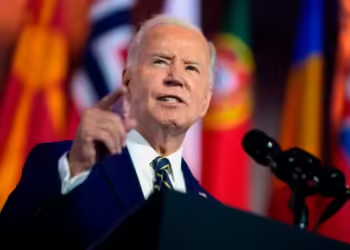‘The consequences are going to be unbelievably bad’: Bush slams Biden’s Afghanistan withdrawal
The former president’s criticism comes amid warnings from western officials that the Taliban could soon topple the U.S.-backed government in Kabul.
POLITICO
By QUINT FORGEY
Former President George W. Bush on Wednesday offered fresh criticism of the withdrawal of American and NATO troops from Afghanistan, as the U.S.-backed government in Kabul appears increasingly imperiled and Taliban fighters continue to make rapid gains across the country.
Asked whether the drawdown was a mistake, Bush told German broadcaster Deutsche Welle in an interview: “I think it is, yeah. Because I think the consequences are going to be unbelievably bad and sad.”
Bush, whose administration launched the U.S. military invasion of Afghanistan in October 2001, specifically cited the plight of Afghan women and girls whom he said could “suffer unspeakable harm” at the hands of the Taliban.
Bush expressed similar concern for the fate of thousands of Afghan translators — as well as their families — who aided U.S. and NATO forces throughout the two-decade war effort.
“It seems like they’re just going to be left behind to be slaughtered by these very brutal people,” Bush said. “And it breaks my heart.”
The remarks from the former president come as even senior Biden administration officials have acknowledged what Pentagon spokesperson John Kirby described as a “deteriorating security situation” in Afghanistan, where the Taliban claims to have overtaken 85 percent of the country’s territory.
The Islamic fundamentalist group has taken over nearly 10 percent of Afghanistan in the last week alone, according to The Foundation for Defense of Democracies, and it now controls 195 of the country’s 407 districts — while contesting another 129.
Despite the escalation in the conflict, the U.S. marked one of the final phases of its drawdown on Monday with the departure of Gen. Scott Miller, the top general in Afghanistan who was among the last of the American forces in the country.
Going forward, Gen. Frank McKenzie — the head of U.S. Central Command — will oversee the mission in Afghanistan from his headquarters in Tampa, Fla., equipped to authorize airstrikes against the Taliban in support of Afghan security forces through the end of August.
After initially pledging a total withdrawal of U.S. troops by Sept. 11, the 20th anniversary of the 9/11 terrorist attacks, President Joe Biden announced last Thursday that the military mission in Afghanistan would conclude on Aug. 31.
In a speech from the White House, Biden denied that a Taliban takeover was inevitable, saying: “The likelihood that there’s going to be a Taliban overrunning everything and owning the whole country is highly unlikely.”
Biden also put the onus squarely on Afghan leadership and security forces to safeguard Kabul, assessing that “they clearly have the capacity to sustain the government in place. The question is, will they generate the kind of cohesion to do it?”
Biden’s timetable for the withdrawal has provoked bipartisan concern from several congressional lawmakers about the Afghan translators and their families still on the ground.
The White House has pledged to evacuate the thousands of Afghan nationals to a location outside the continental U.S. to safely await processing as part of the Special Immigrant Visa programs.
But it still remains unclear where the administration will temporarily relocate the Afghan nationals, and Biden said last Thursday that fewer than half of them have opted to leave the country under the U.S. operation.
Prior to announcing the U.S. withdrawal in April, Biden said he had consulted with both former President Barack Obama and Bush.
Obama said Biden had made “the right decision,” and former President Donald Trump also heralded the pullout of U.S. forces as “a wonderful and positive thing to do.”
At first, Bush’s response to Biden’s order was more muted, keeping with the former president’s tendency to avoid public criticism of his successors.
But a week after the White House’s withdrawal announcement, Bush revealed in an interview that his “first reaction” to the news was fear for the Afghan women and girls who “are going to have real trouble with the Taliban.”
“A lot of gains have been made,” Bush told NBC’s “Today” show at the time. “And so I’m deeply concerned about the plight of women and girls in that country.”
On Wednesday, Bush’s latest remarks on the withdrawal prompted rebukes from those who pointed to the former president’s role in spearheading the initial invasion of Afghanistan — as well as his alleged inattention to the country, which critics argue produced an intractable, multi-generation conflict.
“Of course, Bush forgets we have been in Afghanistan for 20 years because he looked the other way in 2003 and invaded Iraq before the job was done in Afghanistan,” tweeted Mike Walker, the former acting secretary of the Army and deputy director of FEMA.
“By now, you’ve all seen George W. Bush’s comments. He thinks it’s a mistake to pull out of Afghanistan,” tweeted Daniel DePetris, a fellow at the libertarian-leaning think tank Defense Priorities. “The real mistake, though, was transforming a straightforward anti-Al Qaeda mission into a long-term, trillion-dollar state-building enterprise. That started on Bush’s watch.”
The official Twitter account for VoteVets — the progressive, pro-veterans super PAC — tweeted a more concise message: “No one asked, W.”









